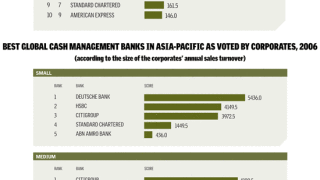EM Polls and Awards
-
Asiamoney's 2005/2006 Brokers poll was the biggest ever. Find out the best brokers in Japan.
-
This year's Cash Management poll disgruntled those banks that dropped down the rankings, while the winners felt recognition of their performance was merited due to service platforms that emphasize quality as well as quantity. Simon Parry reports.
-
PTT Public Co gains the plaudits for Thailand's best large-cap corporate of the past year, while Thai Union Frozen Products and Asian Property Development secure best medium-cap and best small-cap corporates.
-
-
-
In an industry that caters to the risk-averse on one hand and the risk-hungry on the other it means opportunities abound. Chris Wright reports.
-
Asia's private banks are enjoying enormous levels of growth as more and more wealthy individuals in the region squirrel away their wealth. But while the region's rich claim that a personal touch is most important when picking their preferred bankers, in reality the industry giants are making out best, as Asiamoney's second Private Banking Poll reveals. Simon Parry reports on why bigger seems to be better in wealth creation.
-
Asiamoney profiles the region's best equity researchers to find out what makes them No. 1.
-
The best country brokers use local market and client knowledge to compete on their home turf against the powerful global players.
-
Asia's once-insurmountable barriers are becoming blurred, but the best financial institutions still stand out. ASIAMONEY polls regional analysts and investors to find the best homegrown banks and trading houses.

